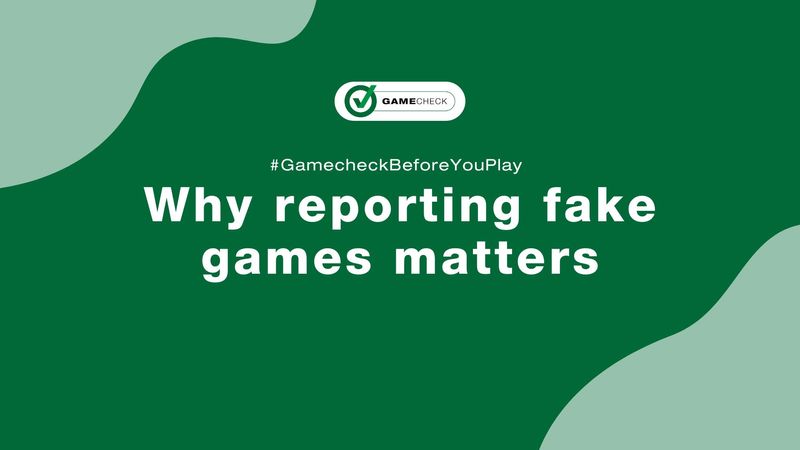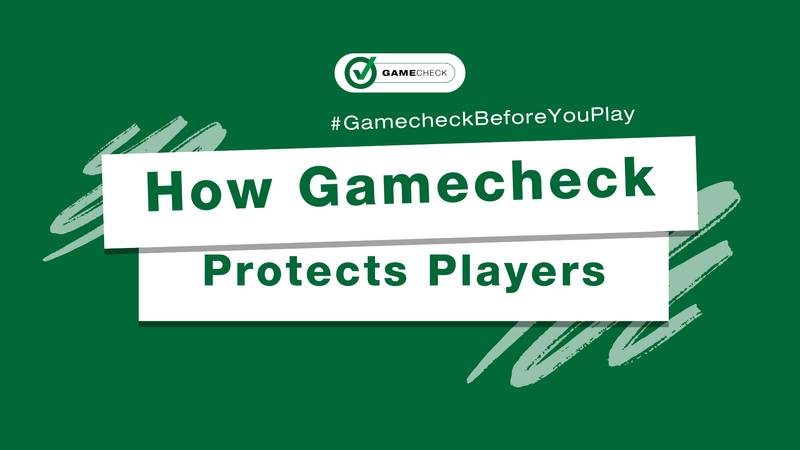Why reporting fake games matters
7 min read
Key Highlights
- The negative impact of fake games
- How to identify fake games
- The importance of reporting fake games
- How can players report fake games
- How to report a suspicious online casino with Gamecheck
- Uniting against fake games: the power of collaboration
Over the years, the online casino industry has grown into a highly successful sector built on trust and security. However, the rise of fake games threatens to undermine this integrity, posing significant risks to players, operators, and game providers worldwide. To ensure the continued credibility of the iGaming industry, all industry stakeholders must take a more active role in identifying and reporting these fraudulent games.
The increasing availability of fake games on suspicious websites and URLs underscores the urgent need for a united, industry-wide response. A collaborative approach where game providers, operators, and players join forces, is crucial to effectively tackling this growing threat.
Online casino fraud takes many forms, and engaging with fake games not only results in unfair gameplay but also exposes players to cybercriminal activities. These fraudulent platforms can compromise personal data, facilitate financial theft, and undermine trust in the industry. By remaining vigilant and actively combating fake content, the industry can safeguard its integrity and ensure a secure gaming environment.
Unlicensed online casinos pose significant risks, often operating outside regulatory frameworks and disregarding fair gaming practices. These rogue operators may refuse to honour winnings, delay pay-outs, and exploit financial transactions. Worse still, they harvest personal information for fraudulent activities, leading to financial losses and privacy breaches.
Most fake online casinos rig their games to guarantee player losses while exploiting bonuses and promotions through deceptive tactics. Scammers often send emails impersonating legitimate online casinos, tricking players into revealing sensitive details.
Fraudulent online casinos frequently lure players with unrealistic bonuses and rewards, pressuring them into hasty deposits or enticing them with non-existent offers. Recognising these red flags and exercising caution is essential to staying protected in the online gaming landscape.
Why are online casinos so popular with fraudsters?
Data analysis has helped us to identify two major reasons online casinos are so attractive to fraudsters:
- Gambling sites host thousands of online players globally. This means millions of transactions take place daily with tons of sensitive data that can be stolen not to mention credit card fraud etc.
- Cash rewards, bonuses, welcome packages, and other promotions provide opportunities for different fraudulent approaches without even the need to create accounts or engage with stolen credentials.
The negative impact of fake games
Those players that knowingly or unknowingly, engage with fake games are at risk of financial losses, since most of these games are rigged in favour of the casino. Besides, if you're using a fake version of a game, you could face legal action depending on your country's copyright laws. Many online gaming platforms also detect and ban accounts using unauthorised copies.
Game developers spend years creating and designing innovative games.
Fake games tarnish the brand image of game providers, reducing trust in the authenticity of their products.
They harm the reputation of legitimate game providers and result in revenue loss and legal penalties.
-1.png)
Fake games reported by players
In 2018, a group of players noticed some major discrepancies in the performance of certain games. These players were proactive about their suspicions and made a comparative analysis of gameplay footage. They reported their findings and concerns to the legitimate game provider whose games were being copied, and the company launched an investigation. It was confirmed that rogue operators were using pirated versions. Regulatory Authorities blacklisted the sites, and player awareness campaigns were launched.
Another group of players noticed suspicious activity while playing on an online casino that offered unique variations of classic casino games. These players tracked thousands of game rounds and their data revealed that the roulette was indeed rigged. The odds were manipulated in favour of the casino, effectively making the game fraudulent.
Yet another group of players reported some suspicious websites found to be distributing fake games with rigged mechanics that prevented any jackpot wins. The game provider took immediate legal action against these illegal platforms, while emphasising the importance of reporting suspicious game behaviour.
In 2021, another group of players began reporting suspicious activities on certain online casinos. One of the first cases reported on Casinomeister, was a site offering fake slots. A team of experienced players and industry watchdogs started analysing the suspected fake games. They conducted tests by checking for official licensing information through official regulators, and using software to analyse game randomness.
The official game providers launched investigations and several illegal casinos and software providers were identified as the source of these fake games. The response included blacklisting the offending casinos; legal action taken by affected game providers to shut down unauthorised operators; and public warnings issued by regulators urging players to verify online casino licenses and game providers before playing.
As a result, several fraudulent online casinos were shut down. Community vigilance does indeed work. Without player reports and independent investigations, many of these cases could have gone unnoticed.
These case studies highlight how collaborative efforts by the various iGaming stakeholders including players, online casinos, game providers and reputable authorities are effective in exposing fake games.
Reputable Authorities need to act fast by blacklisting these fraudulent operators and having their unreliable websites taken down.
How to identify fake games
Adopting a cybersecurity-first mindset is crucial.
Players have started demanding more transparency in casino licensing and software authenticity, and reputable casino affiliates introduced stricter vetting processes. Industry-wide cooperation also means security measures will be adopted faster.
Advocacy amongst players on independent forums can alert other players that there are fake games that need to be avoided. Education campaigns can raise awareness among players about how to identify and avoid fake games.
Firstly, you need to verify that the online casino is licensed by a Reputable Authority such as the UK Gambling Commission (UKGC) or the Malta Gaming Authority (MGA), whose main role is to license, regulate, and provide guidance to businesses offering gambling services. Licensed online casinos display game provider logos that, when clicked, redirect players to the provider’s official website.
Verify game certifications
Legitimate online casinos use games audited by firms like eCOGRA, GLI, or iTech Labs. Players should always check for these certifications.
Review player feedback
Researching player experiences and reading player reviews can reveal whether a casino has been accused of hosting fake games.
Utilise game verification tools
Players can also use game verification tools such as Gamecheck, where they can easily check the authenticity of the game they are playing.
-1.png)
The importance of reporting fake games
Reporting fake games is essential to maintaining a fair and transparent gaming environment. Players should immediately report any suspicious games to game providers and gaming forums.
Online casino operators should conduct regular audits to ensure that all the games they are hosting are licensed and provided by reputable game providers.
Regulatory action is often triggered by reports made by players and game providers.
Regulators need to act quickly and launch their investigations immediately.
How can players report fake games?
Players who encounter fake games can take action by following these steps:
- Players can report suspicious activities to the online casino’s support team.
- If fraud occurs, players should report the incident to the Reputable Authority.
- Players can also request verification of fake games through Gamecheck's website.
- Upload any evidence you may have, and our team will investigate.
Gamecheck's commitment to transparency ensures that players and industry stakeholders can trust our verification processes. Our reporting and verification systems are structured to maintain credibility and provide clear, accessible information to users.
How to report a suspicious online casino with Gamecheck
- Submit a report via the Gamecheck website or Instagram DMs.
- Gamecheck carries out an investigation based on the player’s evidence.
- The verification process includes analysing gameplay, tracking game launch URLs.
- Findings are validated and the casino is either flagged or cleared.
- Status updates are provided on Gamecheck’s platform and social media.
Verification methodology
Our verification process follows a structured, multi-step approach:
1. Initial Screening
Gamecheck collects data from multiple sources, including player reports.
2. Technical Analysis
Our team investigates game behaviour and software authenticity.
3. Collaboration with Game Providers
Findings are shared with game providers to validate or dispute flagged cases.
4. Final Decision
Online casinos are categorised as either "Real" or "Fake."
5. Public Disclosure
Updated online casino statuses are made available via Gamecheck’s website.
Visit Gamecheck if you want to report a fraudulent online casino or a fake game.
Concluding remarks
Players play a pivotal role in the battle against fake games. As the first line of defence, they are often the first to notice fake games while browsing various online casinos.
For this reason, it is vital that players report any suspicious games or activity immediately. As shown in the case studies above, when players report fake games and alert legitimate game providers and regulators, this collective action triggers powerful, industry-wide responses.
The iGaming community is unwavering in its commitment to player protection. If you find yourself a victim of online casino fraud or fake games, remember you are not alone. A strong community of players, alongside a well-regulated legal framework, stands ready to support you.
Never hesitate to report any suspicious games to the official game provider and the reputable authority in your region. When in doubt, Gamecheck offers a free resource to request investigations into a game’s authenticity.
Uniting against fake games: the power of industry collaboration
To effectively combat fake games, the iGaming community must stand united.
A coordinated effort among players, genuine online casinos and game providers, and reputable authorities is essential to swiftly identify and shut down fraudulent sites that offer fake games. By fostering collaboration and open communication, the iGaming industry can create a more transparent and secure ecosystem. This collective vigilance not only protects all the stakeholders involved, but also enhances trust and integrity within the iGaming community, ensuring a fair and secure environment for all.
Related Articles









